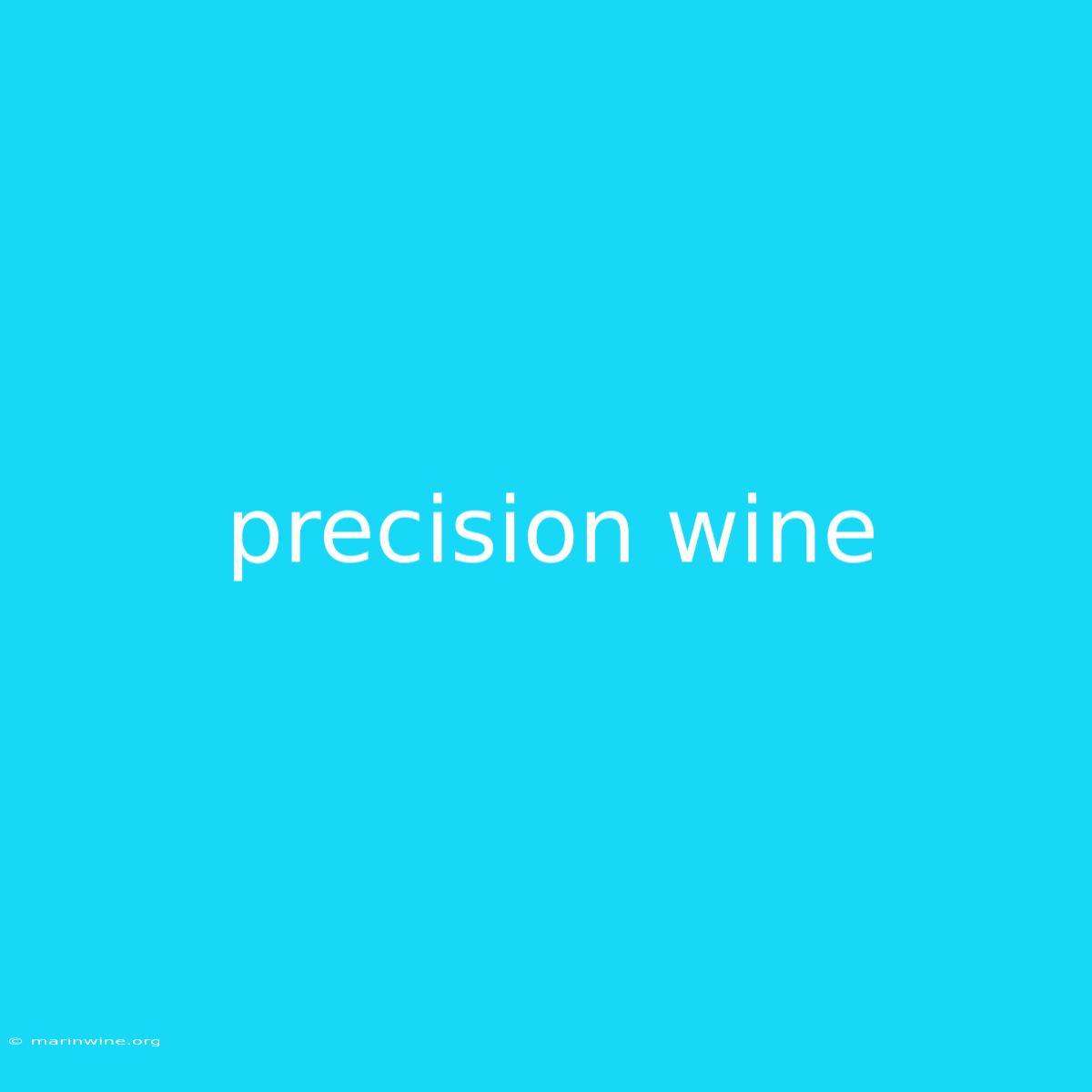The Art of Precision Winemaking: Unveiling the Secrets of Perfection
Have you ever wondered how some wines achieve such breathtaking complexity and balance? It's not just about the grapes – it's about the meticulous craftsmanship, the pursuit of perfection, the precision winemaking.
Why Precision Winemaking Matters
Precision winemaking is a modern approach that combines traditional techniques with cutting-edge technology. This revolutionizes the winemaking process, resulting in wines of exceptional quality, consistency, and character. It emphasizes understanding the vineyard and its unique terroir, meticulously controlling the fermentation, and precisely manipulating the winemaking process to achieve specific flavor profiles.
Key Takeaways of Precision Winemaking
| Key Takeaways | Description |
|---|---|
| Data-driven decision-making | Utilizing sensors, drones, and software to collect and analyze data on vineyard conditions, grape ripeness, and fermentation progress, allowing for informed decisions throughout the winemaking process. |
| Precise control of fermentation | Monitoring and managing temperature, oxygen exposure, and yeast activity during fermentation to achieve desired flavor profiles and ensure consistent quality. |
| Optimized blending and fining | Employing advanced techniques to analyze and blend wines, and to precisely remove undesirable components, resulting in wines with optimal clarity, balance, and complexity. |
| Sustainable practices | Implementing eco-friendly techniques to minimize environmental impact, conserve resources, and enhance the quality and sustainability of the vineyard and the winemaking process. |
| Focus on terroir and varietal expression | Utilizing precision techniques to enhance the unique characteristics of the grapes and the vineyard, resulting in wines that truly express their origins and varietal qualities. |
Precision Winemaking: A Deeper Dive
The Vineyard: A Precise Ecosystem
Precision winemaking begins in the vineyard. Advanced technologies like satellite imagery, drones, and sensors are used to monitor vineyard health, soil conditions, and grape ripeness. This data allows winemakers to precisely manage irrigation, fertilization, and harvesting practices, ensuring that the grapes are at optimal ripeness for the desired flavor profile.
The Fermentation: A Controlled Alchemy
During fermentation, precision plays a crucial role in controlling the transformation of grape juice into wine. Winemakers use temperature-controlled tanks, oxygen management systems, and precise yeast strains to manipulate the fermentation process, maximizing flavor extraction and achieving specific aromatic characteristics.
Blending and Fining: The Art of Balance
Precision winemaking extends to the blending and fining stages. Sophisticated analytical techniques allow winemakers to understand the individual components of the wines and create harmonious blends. Fining processes are also precisely controlled to remove unwanted particles and enhance the wine's clarity, texture, and complexity.
Sustainable Practices: A Responsible Approach
Precision winemaking is inherently linked to sustainable practices. By using technology to optimize vineyard management, water usage, and energy consumption, winemakers can reduce their environmental impact while ensuring the long-term health of the vineyard and the quality of the wines.
Understanding the Importance of Precision Winemaking
Precision winemaking is not about replacing traditional techniques but rather about complementing them with cutting-edge technology. It allows winemakers to achieve unprecedented levels of quality and consistency, while respecting the unique characteristics of each vineyard and grape variety. This approach allows for greater control over the entire winemaking process, leading to wines that are both exceptional and sustainable.
Precision Winemaking: FAQ
| Question | Answer |
|---|---|
| What is the main goal of precision winemaking? | To achieve wines of exceptional quality, consistency, and character while respecting the unique terroir of each vineyard and the specific characteristics of each grape variety. |
| Does precision winemaking use only technology? | No, precision winemaking combines traditional winemaking techniques with modern technology, creating a synergistic approach that enhances quality and sustainability. |
| How does precision winemaking impact the environment? | By optimizing vineyard management and resource utilization, precision winemaking reduces the environmental impact of wine production, promoting sustainable practices and long-term vineyard health. |
| Does precision winemaking affect the taste of wines? | Precision winemaking helps to enhance the unique flavor profiles of wines by allowing for more precise control over fermentation and blending, resulting in wines that are more complex and balanced. |
Tips for Enjoying Precision Wines
- Pay attention to the label: Look for wineries that emphasize precision winemaking techniques in their production.
- Explore different regions: Discover wines from regions known for their commitment to precision winemaking.
- Seek out diverse varieties: Explore wines made from unique and lesser-known grape varieties that showcase the potential of precision winemaking.
- Experiment with different styles: Explore wines from various winemaking styles, from traditional methods to cutting-edge techniques, to appreciate the spectrum of precision winemaking.
- Talk to winemakers: Engage in conversations with winemakers to learn about their approaches and the unique characteristics of their wines.
Summary of Precision Winemaking
Precision winemaking is an innovative approach to winemaking that leverages advanced technology and data to achieve unprecedented levels of quality and consistency. It embraces sustainability, respects terroir, and enhances the unique characteristics of each grape variety. By combining traditional techniques with modern innovations, precision winemaking offers a glimpse into the future of winemaking, where excellence and sustainability intertwine seamlessly.

